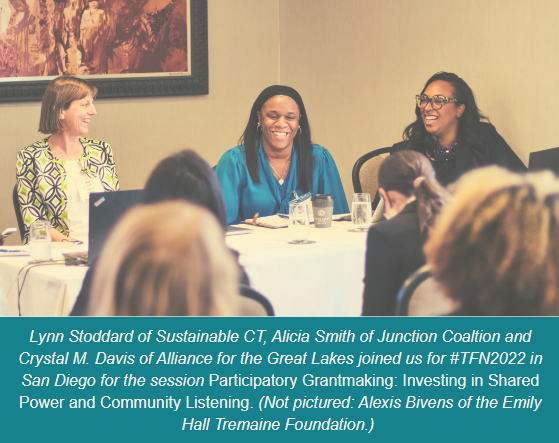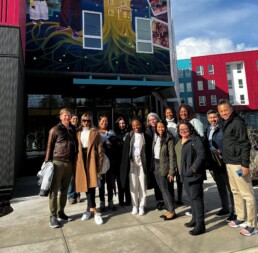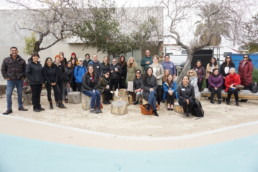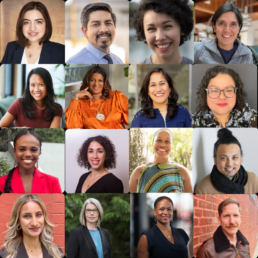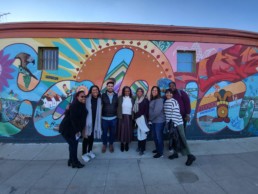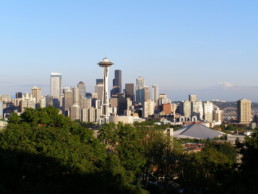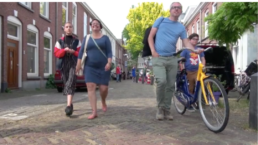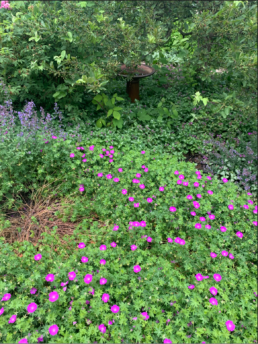Going PLACES: Perspectives, Reflections, and Authentic Storytelling
BY Shilpa Shankar, Program Associate; Equity Lead at the Robert Wood Johnson Foundation, and a 2023 PLACES Fellow
PLACES, which stands for Professionals Learning About Community, Equity and Sustainability, is a year-long learning journey designed to help sixteen professionals in philanthropy deepen their understanding of systemic inequities and acquire the tools necessary to challenge these inequities, confront harmful truths, and advocate for just practices at their respective organizations. I have been in my role at the Robert Wood Johnson Foundation for about two years, and I applied to the PLACES fellowship to learn firsthand from leaders in communities through site visits, as well as from my peers in the philanthropic sector, about how I can ensure that my own grantmaking practices truly and authentically serve historically underrepresented communities without perpetuating harm. I wanted to dive deep into the equity issues that affect communities throughout the United States and dive even deeper into how philanthropy may have contributed to the perpetuation of systemic inequities and how the sector can truly do better.
Ahead of my first site visit as a 2023 PLACES fellow in April, I had the pleasure of attending The Funders Network’s annual conference in New Orleans, La., in March. On the first morning of the TFN conference, I grabbed my breakfast and scanned the conference room for an empty seat, finding a spot at a table with five other attendees with smiling faces who invited me to join them. These attendees turned out to be PLACES alums. Curious about what was in store for me in the coming months, I asked my breakfast company what to expect as a fellow, and I distinctly remember the first answer I was met with: get ready for one of the most transformative experiences of your professional life thus far.
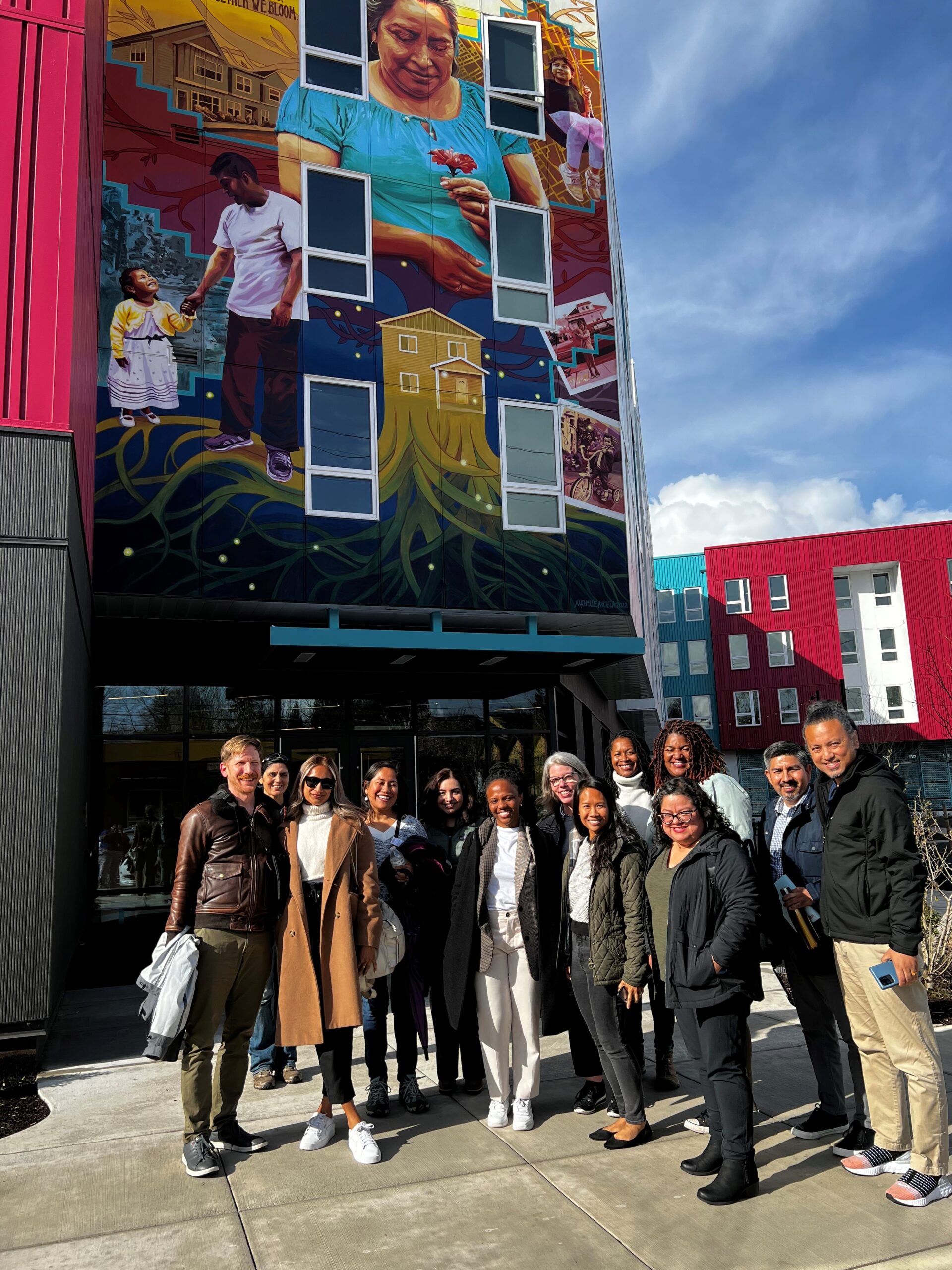
When I landed in Portland for my first site visit in April, the alum’s words replayed in my head, and I was about to experience just how true his words were. On our first day in Portland, our group had the privilege of hearing from two historians: Direlle Calica of the Institute for Tribal Government and Zachary Stocks of the Oregon Black Pioneers. Their perspectives on Indigenous and Black history in Portland emphasized how forces of systemic oppression dictate whose stories are rarely ever centered or even mentioned when discussing the origin story of a place. From discussions about the ideas of land ownership versus authentic community stewardship to the harsh realities of the kidnapping and forced migration of many people’s ancestors, I was prompted to reflect on how central our histories are to our own well-being and that of generations to come. What opportunities are robbed from us when our history is robbed from us? How does the erasure of history also erase our safety and the safety of our communities? How do all the interconnected systems, including the healthcare system, education system, and government, continue to implicitly and explicitly ignore certain histories and uplift others? This is something that has come up in my work before, but hearing from those affected every day by the intentional erasure of their histories allowed me to more deeply grasp how solely acknowledgment and understanding, as well-intentioned as we feel it may be, is simply not enough. It prompted me to reflect on how the philanthropic sector itself has contributed to and benefitted from the erasure of certain histories and the centering of others. With these thoughts percolating in my head, we entered day two.
On day two, we visited a group of community farmers at Black Futures Farm. Upon arriving at the farmlands, we all gathered under a tent to escape the rainy weather and learn about the incredible efforts taking place on these lands. Seated shoulder-to-shoulder under the tent, beside an impressive array of freshly grown herbs, we began to listen. We first heard from Malcolm Hoover (co-director) about the daily work that takes place on the farmlands, and how he is driven to action each day by the prospect of giving his community a safe place to gather, not only for food but also for a sense of belonging. Other farmers who followed him shared similar sentiments, as well as their own stories about their personal histories, the histories of their communities, and what connects them to the work. Huddled in this tent together, hearing real human stories, I immediately appreciated the notable departure from how nonprofit organizations and philanthropic organizations usually interact. There were no fancy PowerPoint presentations. No numbers or budgets or impact reports. Just a group of human beings listening to another group of human beings share how their work is driven by a deep love and responsibility for their communities. I appreciated the level of candor that was afforded to us by this group of farmers. Although a number of rigid structures rooted in white supremacy, including philanthropic dollars at times, do not act in their favor, these farmers have found ways to be creative with the resources they do have to ensure their communities are not left behind. Many times, we in the philanthropic sector find ourselves up against barriers - grant timelines, budgets, legal considerations, strategy changes, etc., but hearing from these farmers inspired me to also be creative when confronted with barriers. They are required to do it every single day - and it challenged me in a way that transformed my thinking about how I am able to show up. It prompted me to reflect on how professionals in philanthropy need to get creative to earn their allyship, myself included. I can’t say I have all the answers, but I am excited and deeply grateful to keep learning from these community members. The alum was absolutely correct - transformative is indeed the word.
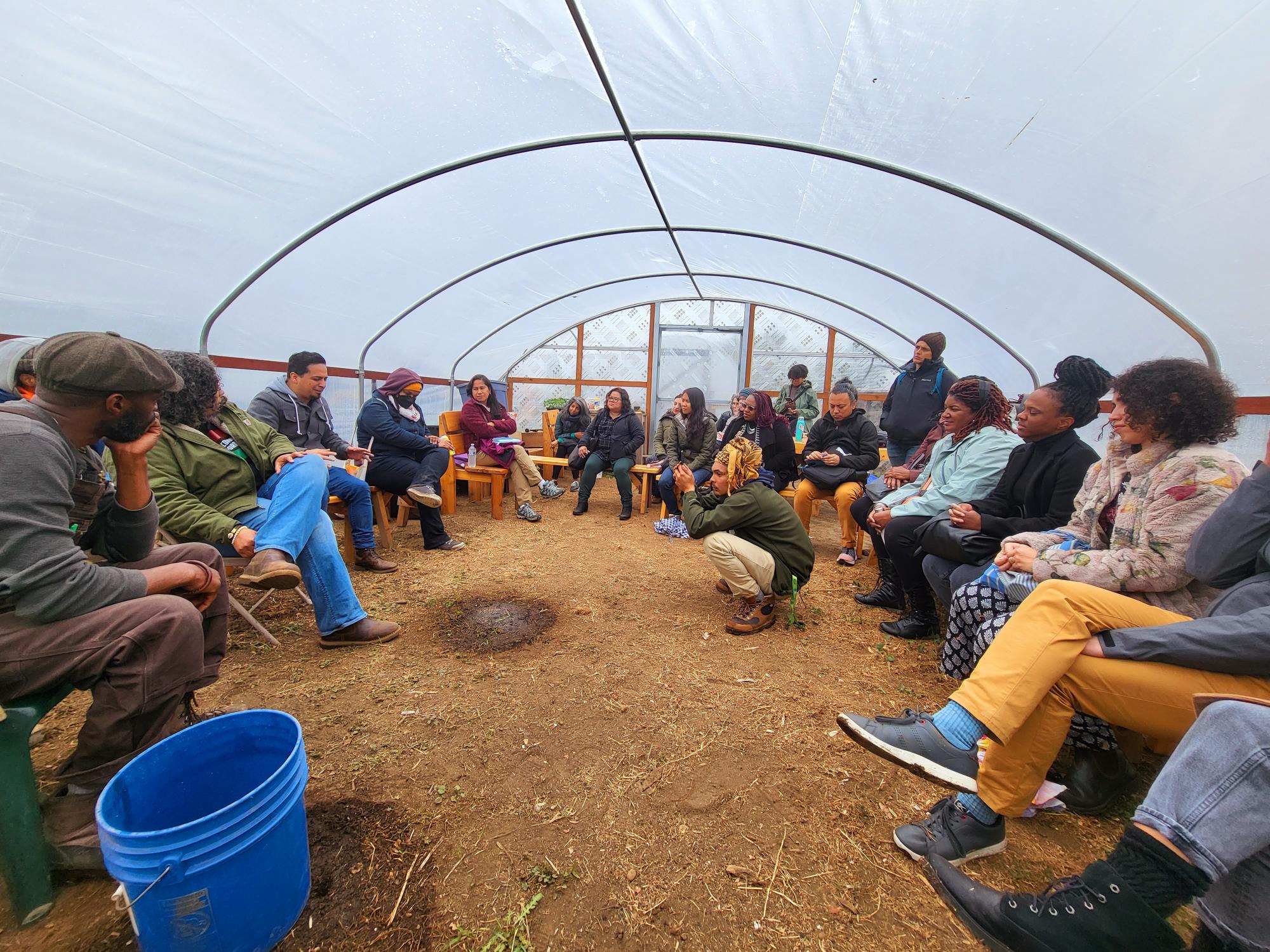
When reflecting on the transformative nature of this first site visit, I would be remiss if I did not mention my fellow cohort members. These 15 individuals supported me, challenged me, and allowed me to grow in ways I never thought imaginable with a group of people I just met. I gained a group of not only colleagues but also good friends! I'm looking forward to the next site visit!
About the Author
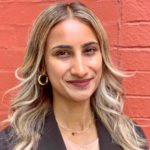 Shilpa Shankar is a Program Associate; Equity Lead at the Robert Wood Johnson Foundation, and a 2023 PLACES Fellow.
Shilpa Shankar is a Program Associate; Equity Lead at the Robert Wood Johnson Foundation, and a 2023 PLACES Fellow.
Meeting the Moment for Water
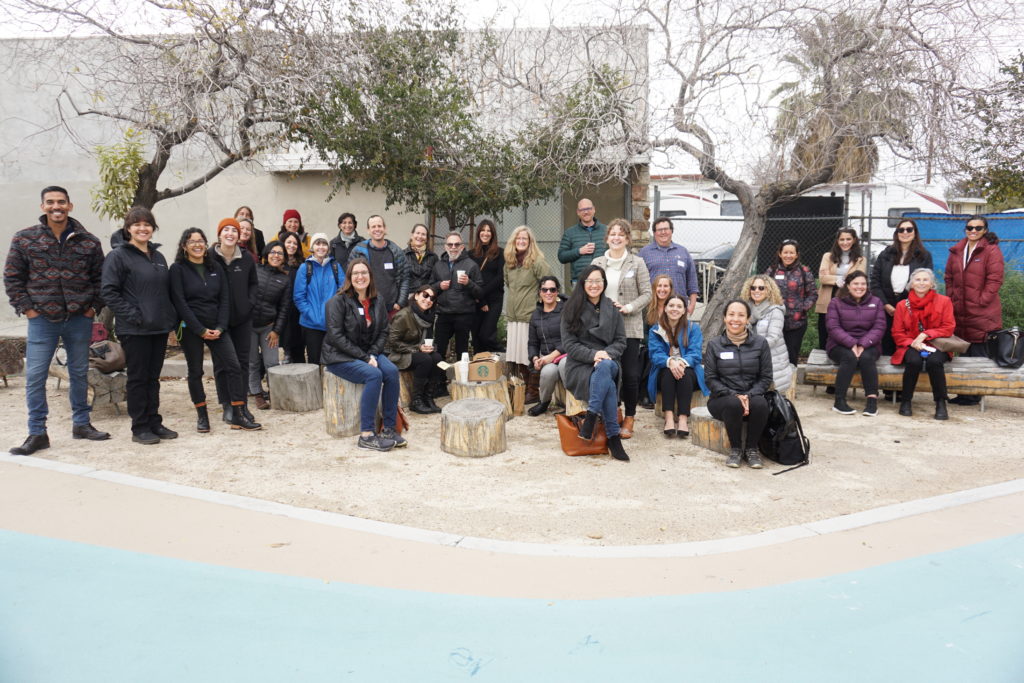
BY Kerry Hastings, Program Coordinator of Urban Water Funders
After a long time apart, the Urban Water Funders were finally able to gather again in person in Los Angeles’ Little Tokyo on January 30-31, 2023. During the last 3 ½ years, the pandemic and escalating climate crises have elevated the crucial role that water plays in our societal health and well-being. Access to clean and affordable water meant life or death for some during the height of the pandemic, and droughts and storms have left many communities with too little water during prolonged droughts or flooded with too much water during extreme storms. At the same time, several historic pieces of federal legislation were enacted to move tens of billions of dollars into water infrastructure over the next several years, causing a rush to ensure all the pieces are in place to support the equitable spending of this money. Need and opportunity are beginning to align in the water space.
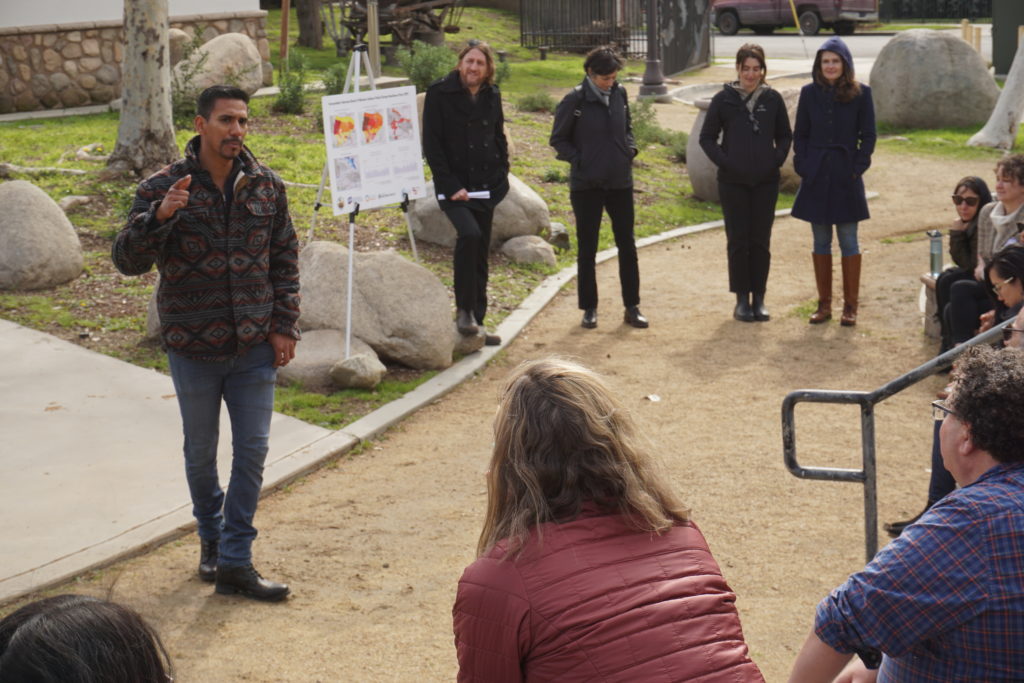
All that to say, funders came hungry to connect with each other and to align and strategize on their work together. We are grateful to SpringPoint Partners for supporting an extended and meaningful time of reconnection through their “conversation cards” activity that began our first day (we had a unique Urban Water Funders deck, but you can find the original cards here). We spent most of the day learning from water leaders in LA, including tribal leaders who grounded us in the history of water theft from the local Indigenous peoples. We learned about the diverse OurWater LA coalition that worked together to pass the historic stormwater measure (W) and the ReDesign LA cohort model that trains and supports small frontline serving organizations to apply for, access, and implement projects with public infrastructure dollars. The latter program is a powerful one for funders and other NGOs to learn from as funding navigator-type models are increasingly popular as a way to support communities most in need of water equity projects but least equipped to access public funding.
We ended our first day with an honest and thoughtful conversation with Jonathan Nelson, who works closely with Assistant Administrator Radhika Fox in the EPA’s Office of Water. Jonathan emphasized that technical assistance is EPA’s number one priority and underscored the tremendous federal investments in technical assistance coming from the federal government. He lifted up the importance of funding smaller, community-based NGOs, when thinking about where philanthropy’s resources can be used best. He invited funders to dive deep into relationships with community organizations who are leading the charge to engage people in long-term water equity efforts.
"I am coming back to my work and partners with more inspiration, context, resolution, and grounding to help ensure we can permanently change where green and water infrastructure goes, who benefits from the federal funds, and how they are designed and developed to meet multiple community-driven priorities."
-Maggie Rwakazina, SpringPoint Partners
Our second day was all about strategizing together with funders sharing their work, strategies, and struggles. We started the day thinking about the broader water ecosystem and how to support collaboration among stakeholders, then dove into how funders engage frontline communities and center equity. We rounded out our day challenging each other to balance how to meet the urgency of this moment, while keeping the long-term vision for water equity in mind, and considering what this influx of spending might cement or unlock. We left ready to roll up our sleeves and get to work.
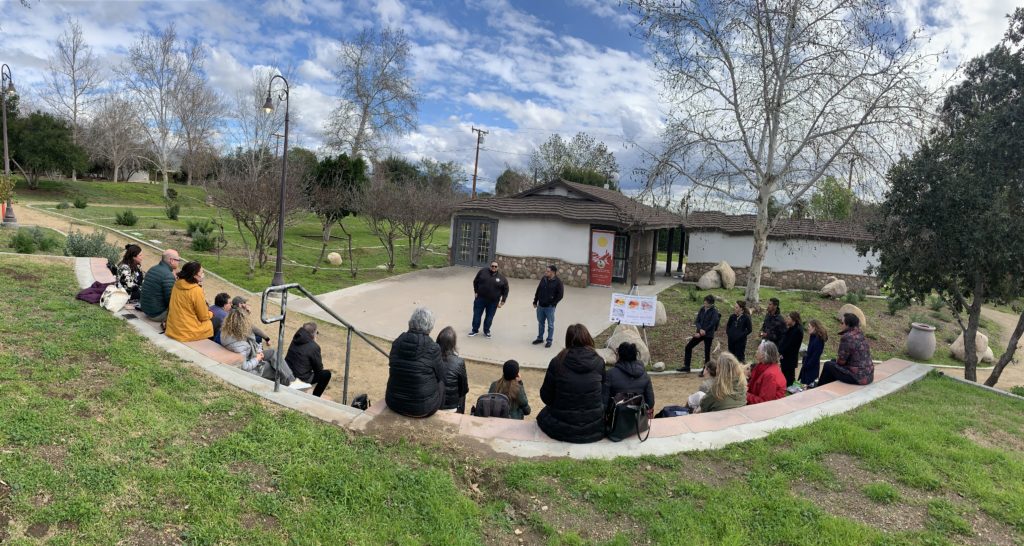
The UWF Steering Committee and TFN staff are excited to build on the work that was prioritized during our time together. We will continue to program events for funders to learn and strategize together and will explore opportunities for how we may collaborate to better meet this moment. We offer our gratitude to our planning committee, speakers, moderators, and field leaders. You can find more resources that were shared at the convening here.
About the Author
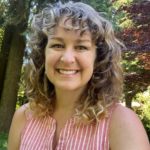 Kerry Hastings is the Program Coordinator for TFN's Urban Water Funders Working Group.
Kerry Hastings is the Program Coordinator for TFN's Urban Water Funders Working Group.
Meet the 2023 PLACES Fellows!
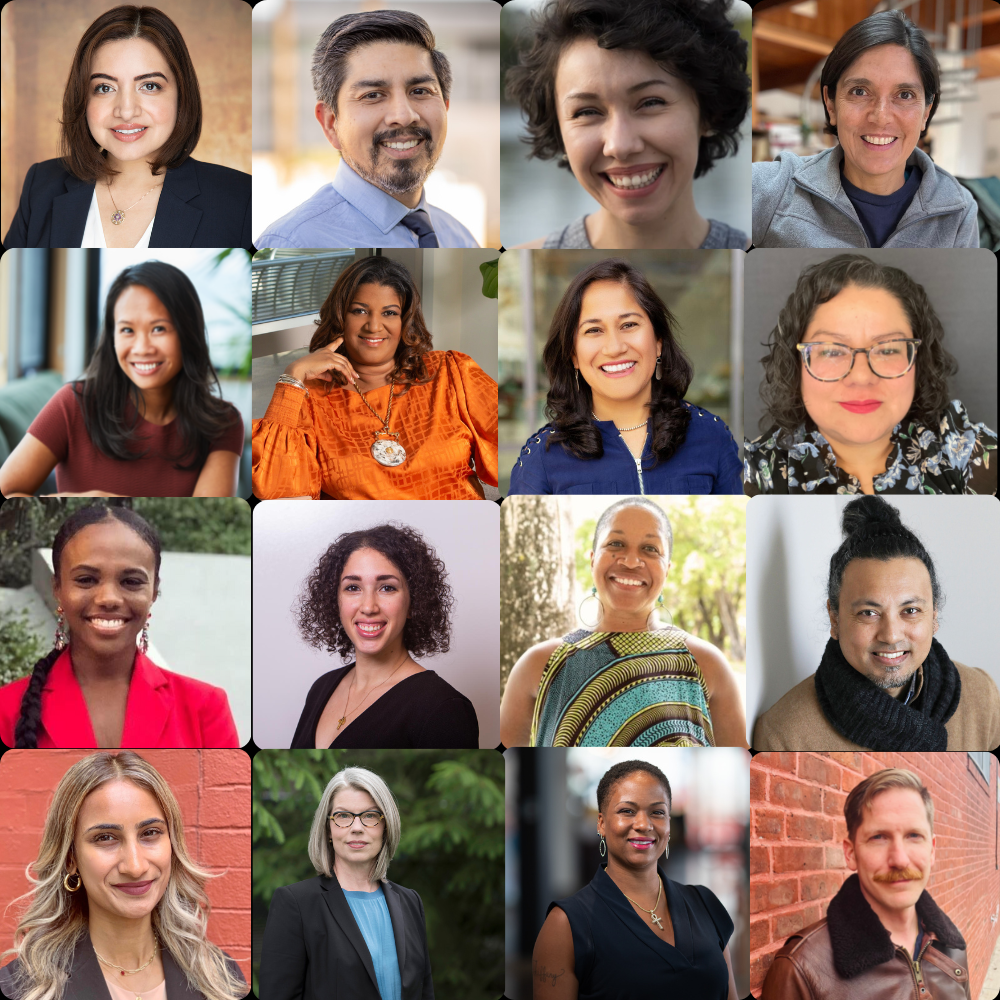
TFN’s vision is to cultivate generations of courageous philanthropic leaders who are engaged, emboldened, and equipped to bring about a just society.
That’s why we are so proud to announce the 2023 PLACES Fellows — 16 exemplary leaders who will embark on a learning journey focused on incorporating an equity and justice lens into their grantmaking and community engagement practices.
They will work together to not only deepen their understanding of structural racism and its malign impacts, but to acquire the tools and resources needed to challenge and change systemic inequities that are negatively impacting our communities and our society.
Over the years, PLACES cohorts have addressed issues impacting disenfranchised communities, including structural racism, gender justice, health equity, environmental sustainability, economic development, and community engagement — asking difficult questions, exploring uncomfortable truths, and confronting their own biases along the way.
As our society continues to wrestle with a long-overdue reckoning on racial justice, it’s essential that our philanthropic institutions work to remedy systemic inequities, including those within their own organizational cultures.
I look forward to learning and sharing alongside these 16 new PLACES Fellows as we embark on this journey together. They represent a wealth of expertise and lived experiences, and hail from diverse geographies and backgrounds.
On behalf of the selection committee (comprised entirely of PLACES alums) and TFN’s PLACES team, including Equity Programs Manager Talissa Lahaliyed and the PLACES Advisory Board, join me in congratulating these outstanding 2023 PLACES Fellows!
The PLACES Fellowship is supported by the generous contributions of various funders and The Funders Network. Key supporters include the Annie E. Casey Foundation, JPB Foundation, Kresge Foundation and Surdna Foundation.
2023 PLACES Fellows
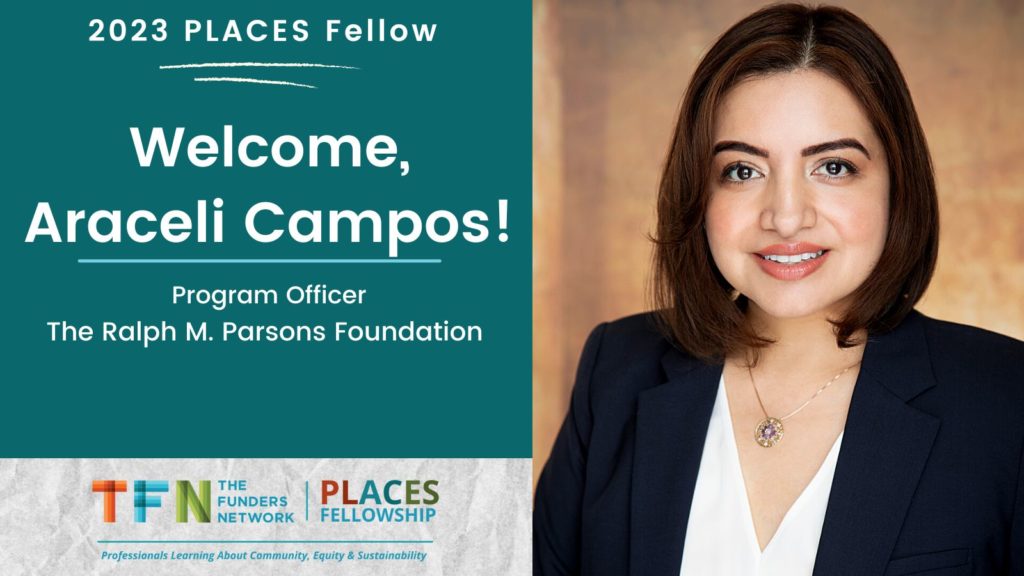
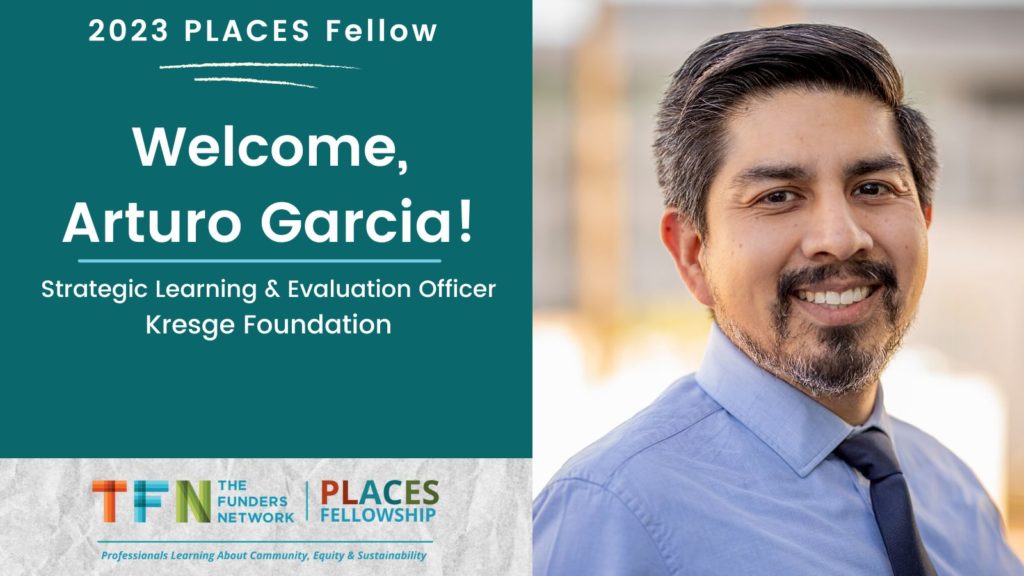
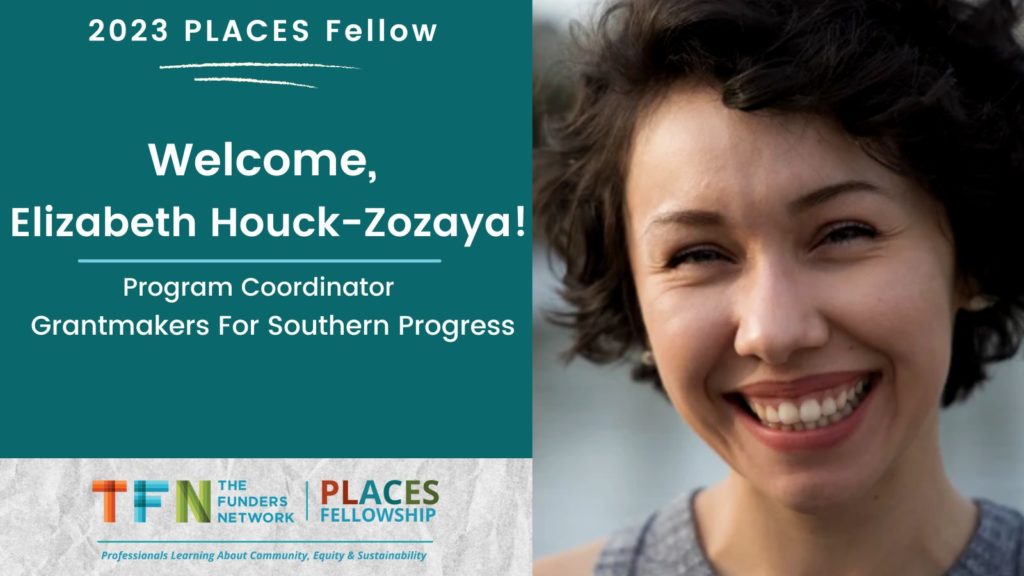
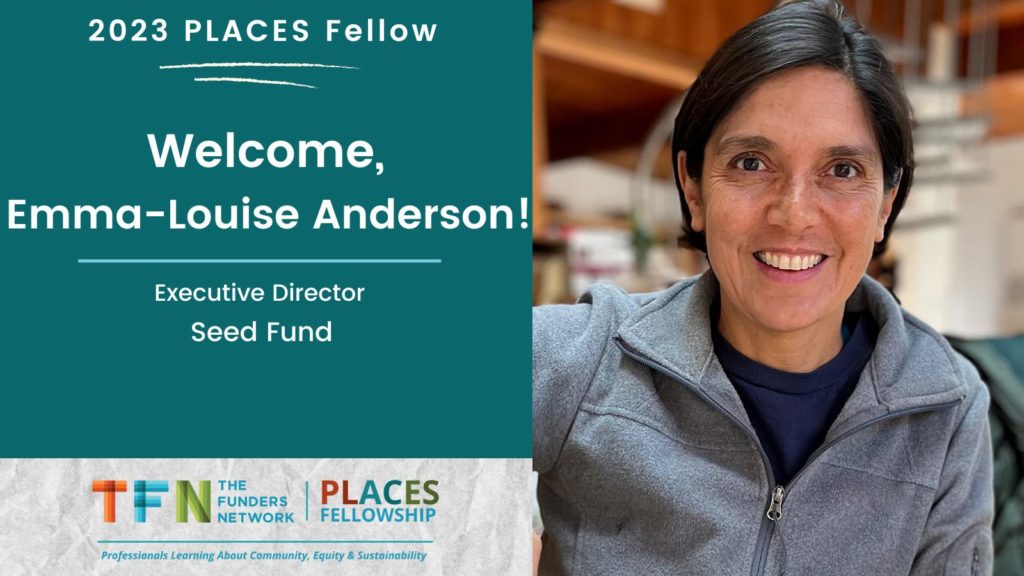
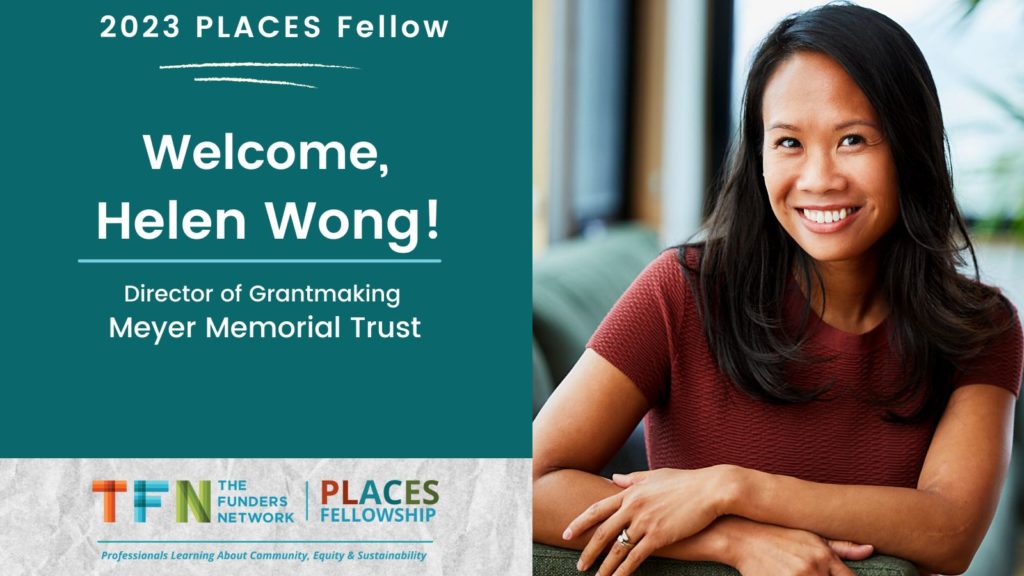
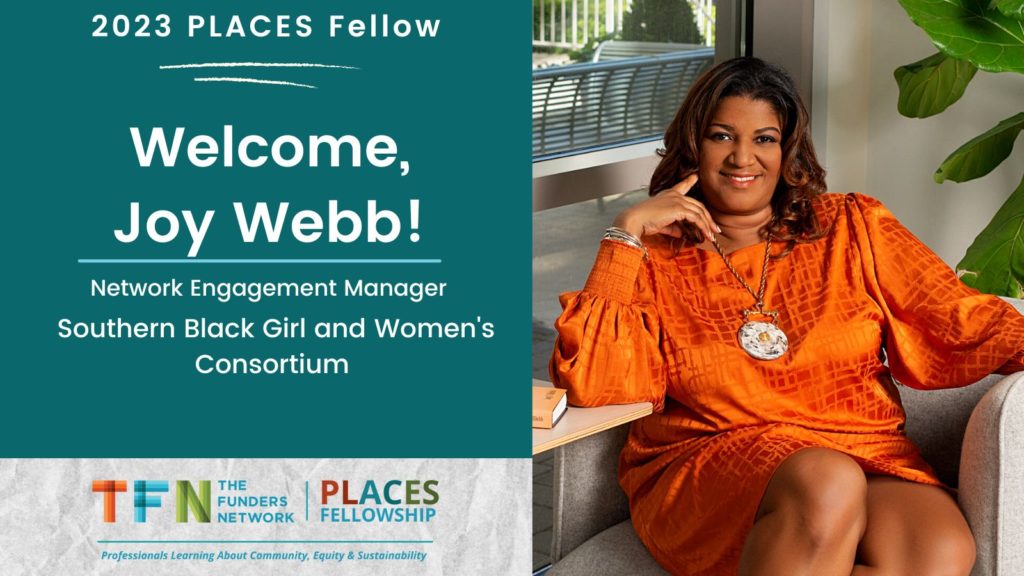
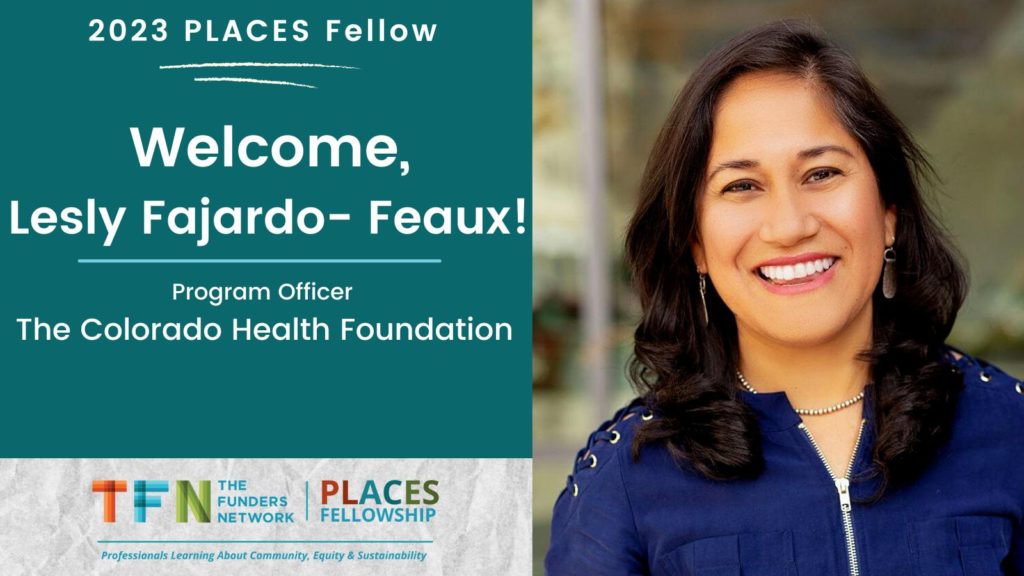
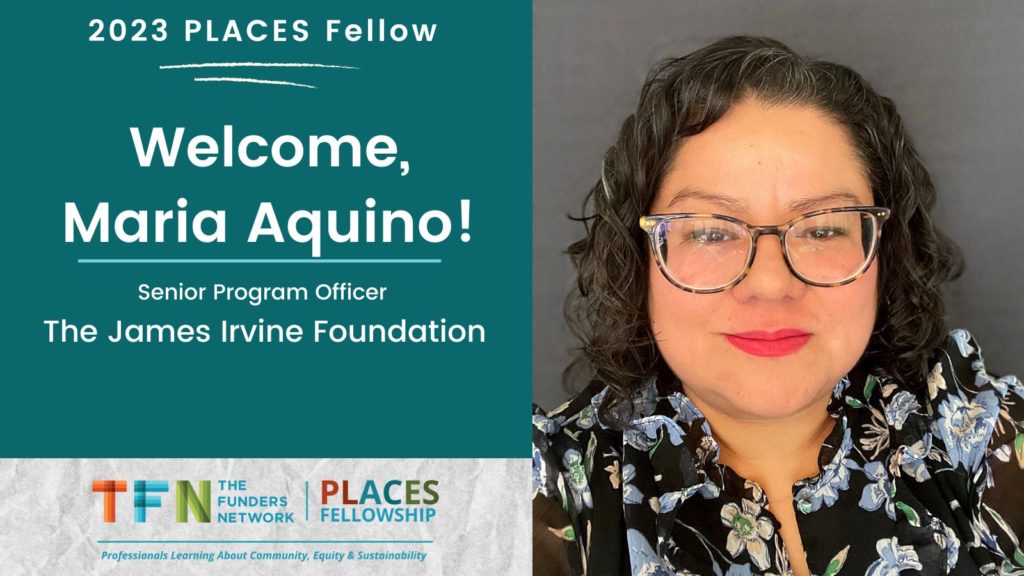
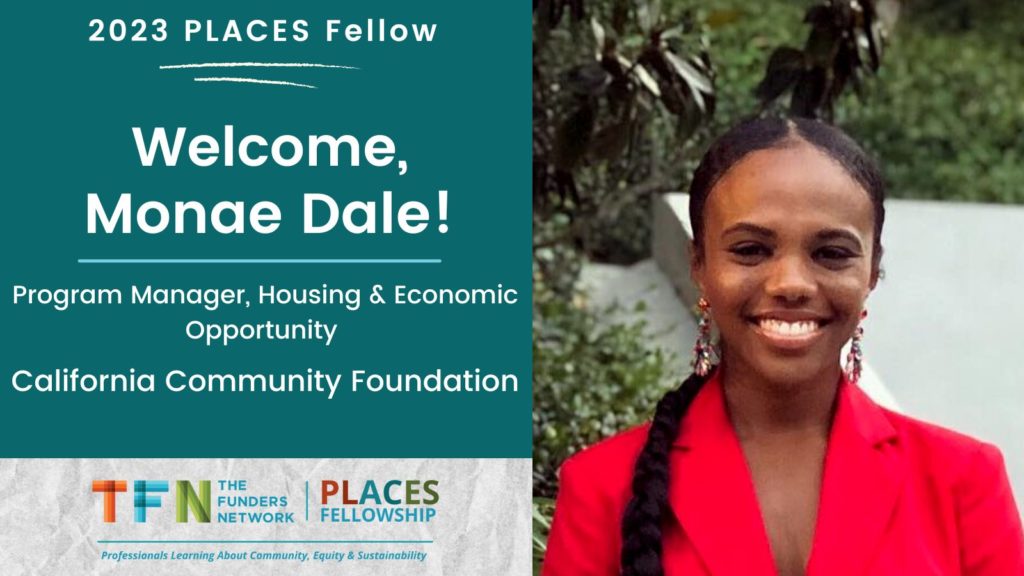
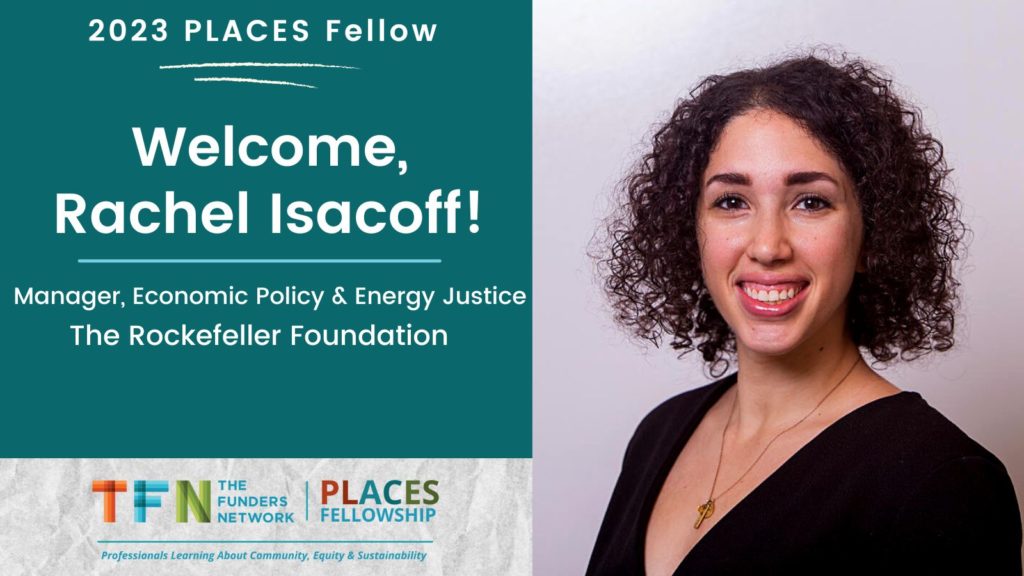
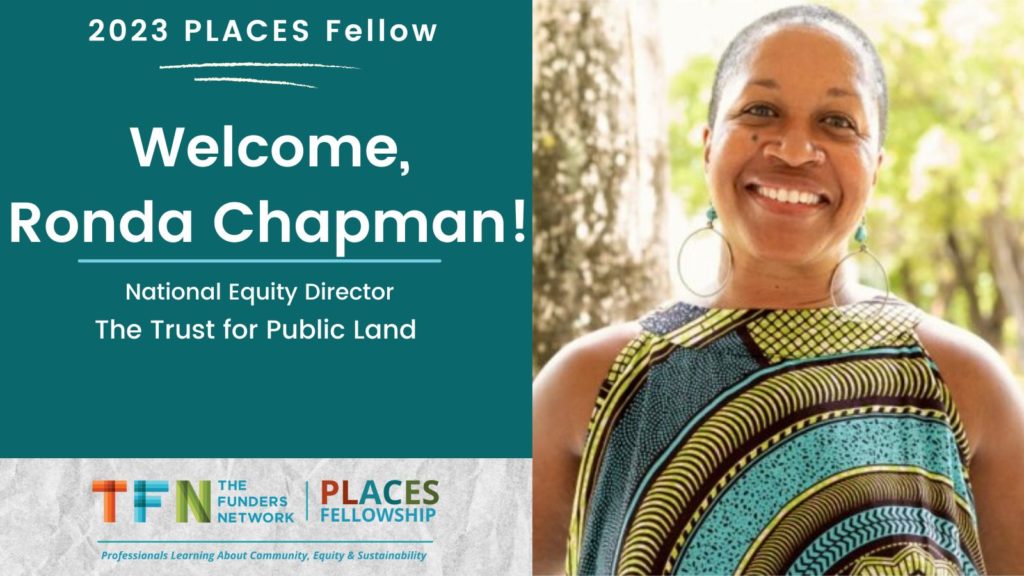
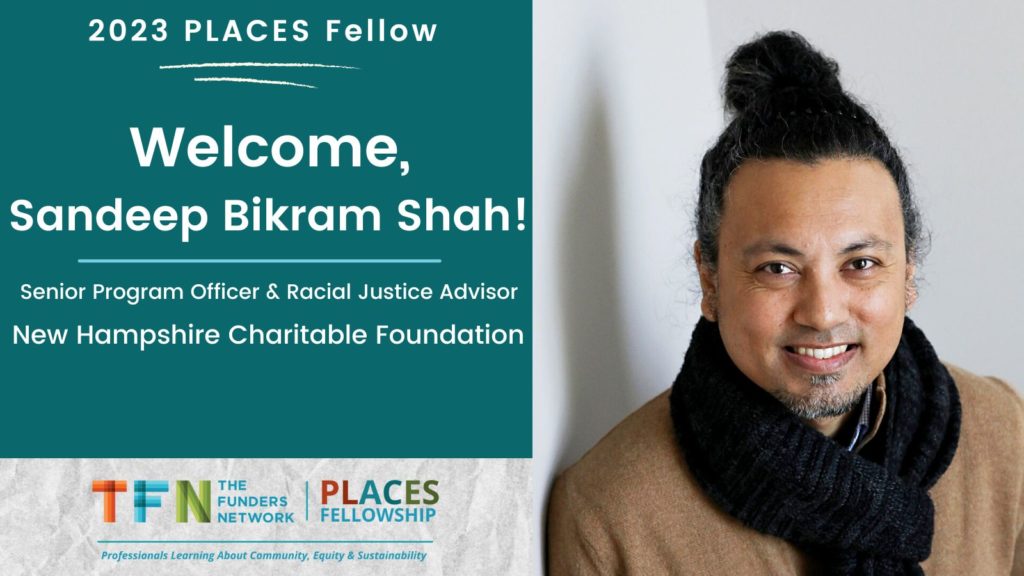
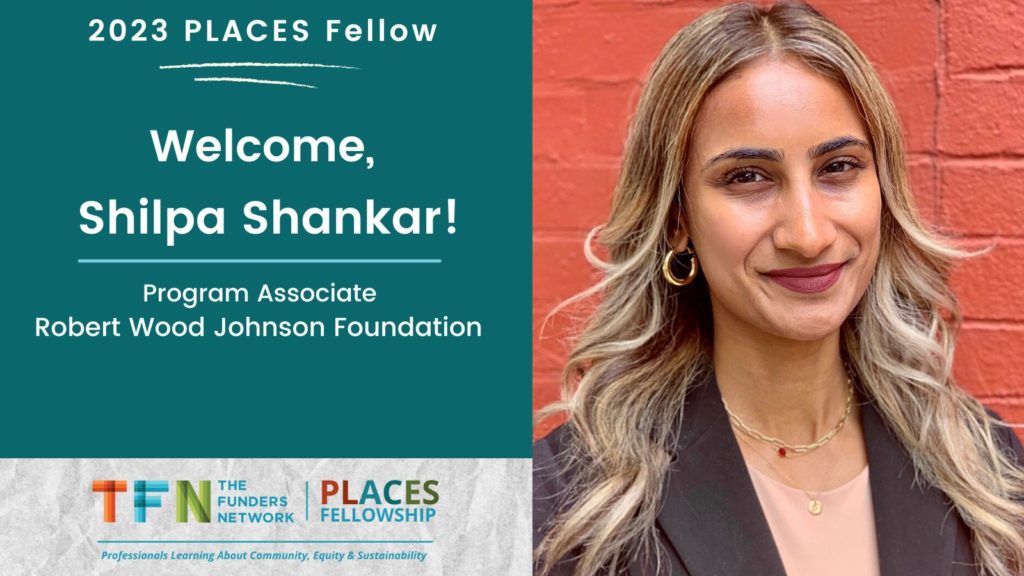
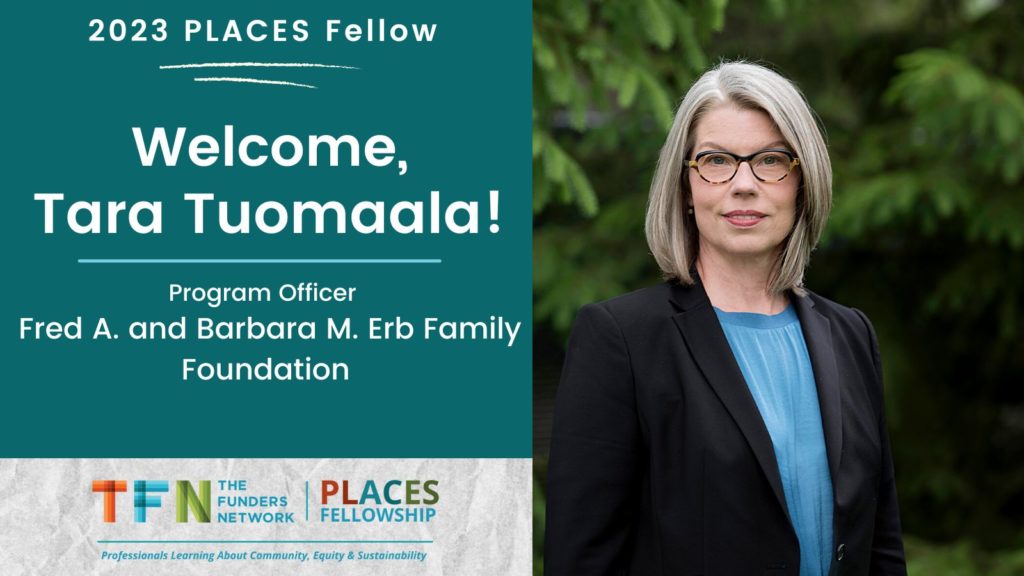
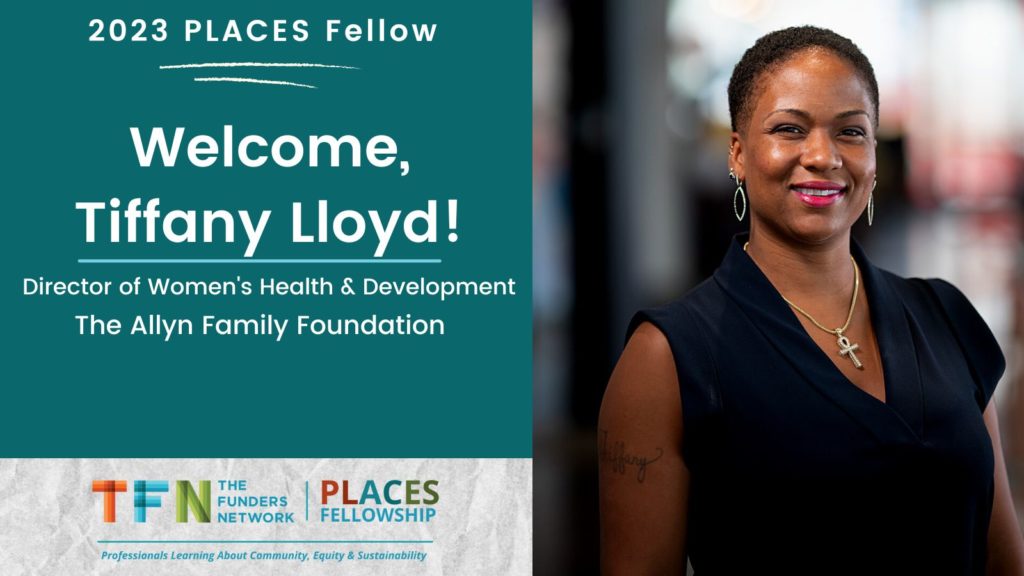
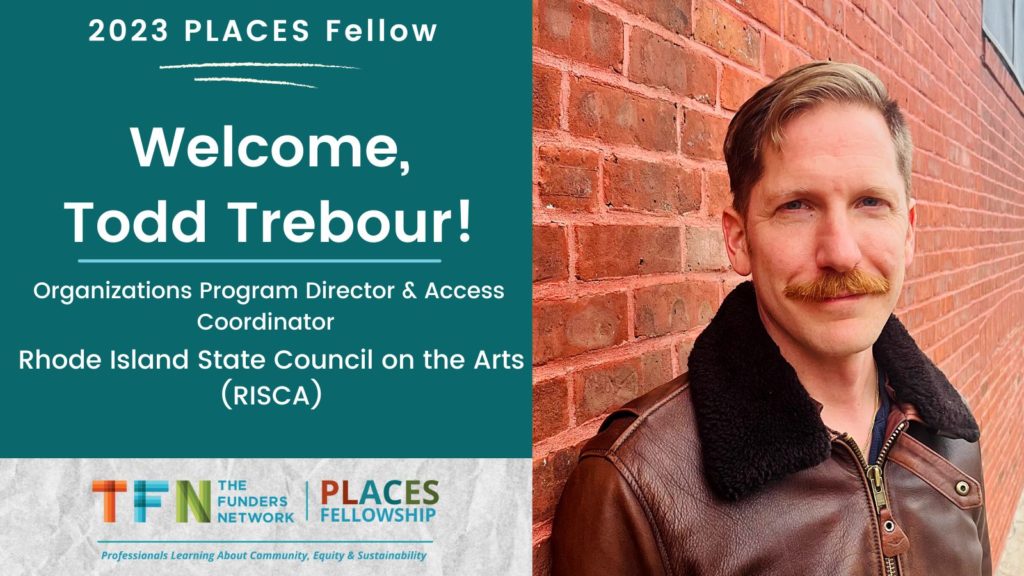
Learn more about PLACES
PLACES X: Stories of Impact
For the 10th anniversary of TFN's PLACES Fellowship, we worked with two award-winning journalists to help capture the stories shared and the lessons learned through the PLACES Fellowship. The result is our PLACES Impact Stories project, which includes profiles written by WLRN social justice reporter Nadege Green and videos created by documentary filmmaker Oscar Corral.
Going PLACES Blog Series
After each PLACES site visit, we ask the fellows to reflect on their experiences in our blog series Going PLACES. Check out some recent highlights from our PLACES alumni.
Questions?
If you would like to know more about PLACES, including ways your organization can invest in our equity-focused PLACES Fellowship and Alumni Network, email Dion Cartwright at dion@fundersnetwork.org.
Going PLACES: 2022 PLACES Fellowship – In Retrospect
BY Katrina Julien, Senior Program Officer at the Community Foundation for Greater Atlanta, and 2022 PLACES Fellow
For The Funders Network, PLACES stands for Professionals Learning About Community, Equity and Sustainability. This is something that all alumni know by the end of the program, as we are encouraged to embody those ideals and be able to introduce them and our cohort at any given moment. Like me, I’m sure that most decide to apply for PLACES as a strategy to strengthen their leadership role and progress in their philanthropic careers. But those who’ve gone through the program know that this is more than just another bullet on your resume — it’s an opportunity to connect what you do with who you are. It’s also a chance to see opportunities in difficult situations, and to envision a world where using philanthropy as a tool no longer does as much harm as it does good.
PLACES is both a professional and personal journey.
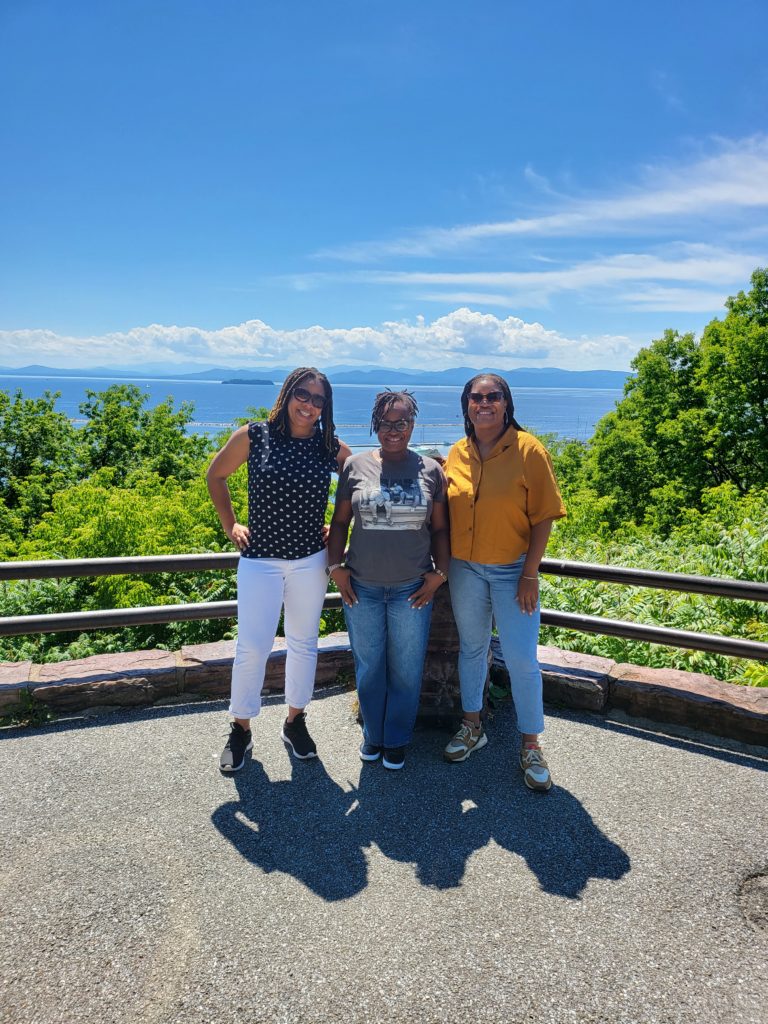
Our first meeting was virtual but still dynamic. We learned a little about each other and broke out into groups to begin to connect with our peers and prepare to head to our first site visit destination, Burlington, Vt.. In Burlington, the PLACES team wasted no time getting us talking about ourselves, our work, and how overwhelming it can be working in a sector that upholds white supremacy culture all while trying to dismantle it from the inside. We heard from foundations at all different stages of embedding equity into their work.
Personally, I got to hear what I must've sounded like when I started in the community foundation, speaking about equity but knowing it hadn't yet been operationalized within my organization. It was hard to watch but incredibly informative. The nonprofit partners were doing some incredible work and creating more diverse spaces — even though it was hard. Though it seemed unbalanced, what I came away with is the realization that to achieve the goals we strive for, philanthropy needs to listen and learn from the examples that community and nonprofit partners present.
When I returned to work, I grappled with these questions: What is the role of philanthropy in dismantling broken systems? Do we work in institutions that are ready to do that? What is my responsibility to ensure equity in my work? The great thing about PLACES is that you work through all your uncertainties with your peers. Your cohort and the PLACES team ensure that you don’t hide from difficult issues and give you the space to unpack them on your own time. By the second site visit in Oklahoma City, fellows were ready to dig into some of those uncertainties.
The Oklahoma City site visit challenged me. There, we heard OKC history as told by a person whose life’s work was to record the history of Oklahoma, but whose unconscious biases were apparent in every historical fact discussed. We also heard from a PLACES alum who was doing amazing work in philanthropy, yet he introduced the idea of strategic complicity — choosing which battles are worth fighting and which you concede to do the greatest amount of good. As a person who was born to challenge everything, this concept was and is the hardest for me to accept. Yes, I understood it, but I didn't like it. The good thing is that the PLACES team knew when to push and when to offer respite. And we spent just as much time learning and acknowledging each other as we did learning about the issues and challenges of the city. We also made sure to see and interact with each city and its history, from the somber reflections at the OKC Memorial to the richness of Burlington’s Intervale Center.
Fresno, Calif., had its unique challenges that philanthropic, nonprofit, and community organizations were working through. Our last site visit in Fresno solidified the idea that no matter the place, no matter the issue (housing, access to water, food insecurity, health and wellness, etc.) the real work is dismantling the power structures that oppress communities. Oppression may look one way in Burlington and another way in Fresno, but the underlying issue is the same: a gross imbalance of power and privilege heavily steeped in racial inequities, and the necessity of returning that power and autonomy to the people and communities that have been disenfranchised to make decisions for their lives.
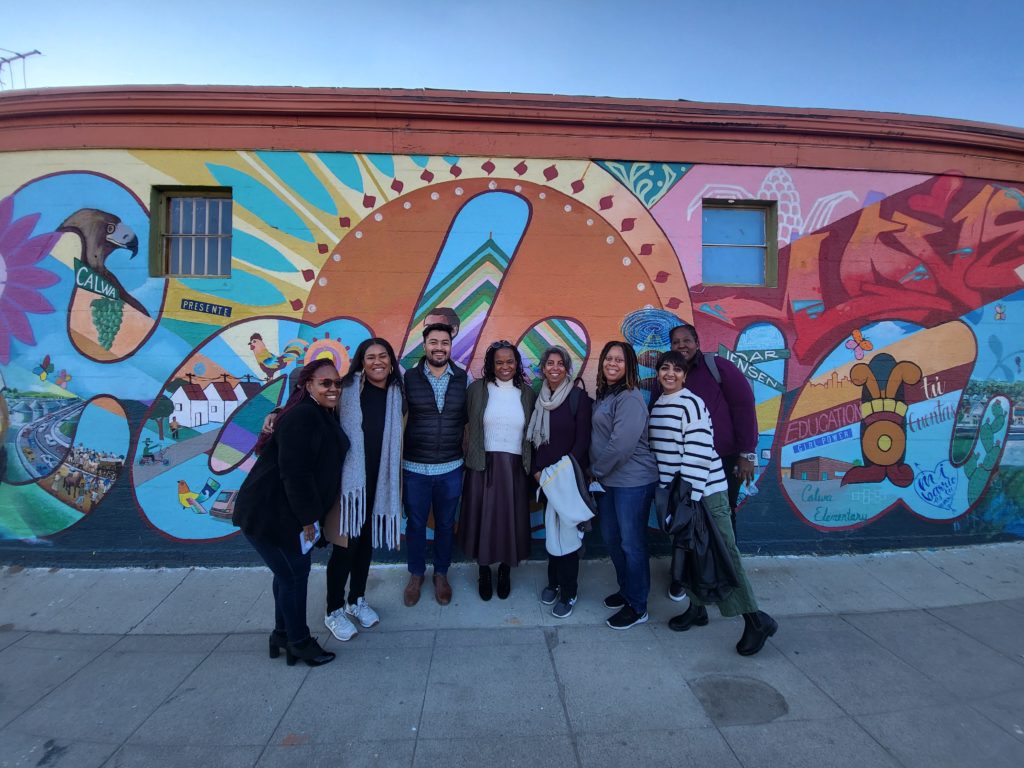
At the end of this journey, I don’t think I’ve found the answers to all my questions. Finding those answers may be a collective journey. Yet, I am so lucky to have my fellowship family to share it with, to commiserate with, to uplift and cheer on. The best leadership advice given in this program is, “find your people, the ones that have your back in this challenging work.” PLACES helps leaders in philanthropy connect with and identify who their people are and challenges us all to get to work.
About the Author
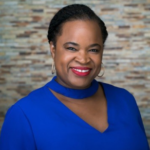 Katrina Julien (she/hers) is a Senior Program Officer at the Community Foundation for Greater Atlanta. She is a member of the 2022 PLACES Fellowship cohort.
Katrina Julien (she/hers) is a Senior Program Officer at the Community Foundation for Greater Atlanta. She is a member of the 2022 PLACES Fellowship cohort.
Los Angeles Funders Collaborative 2022 In-Person Gathering (Cross-Post)

Smart Growth California is an initiative of The Funders Network. Ron Milam, the Director of Smart Growth California, wrote about his experience at the Los Angeles Funders Collaborative Meeting in November.
On November 4th, after not meeting in person for two and a half years due to the global pandemic, the Los Angeles Funders’ Collaborative met in person at The California Endowment. It reaffirmed for me the value of meeting in person and what can happen when folks have the time to connect, reflect and strategize.
Like Smart Growth California’s recent Climate Funders Collaborative (Baja/Imperial/San Diego region) that took place last month, we held the entire meeting outside, one of the perks of a fall day in Southern California. We met in the peaceful courtyard of The California Endowment, a place that in many ways operates like a public square for the social and philanthropic sectors in Southern California.
I always love going to the TCE campus and was so happy to return! It’s a meaningful site to me personally because it’s actually where I met my wife way back in 2009, which now that we have three children, feels like a long time ago! It’s also a place where I presented numerous trainings over the years at the Center for Nonprofit Management, facilitated multiple gatherings for both the Los Angeles Funders Collaborative and Southern California Grantmakers Environmental Funders Group, along with numerous nonprofits over the years like the Green LA Coalition and Los Angeles Food Policy Council. Needless to say, it filled me with great joy to be back in that place with people who I’ve worked closely with over the years.
Read the full post on Smart Growth California's website here.
Climate Funders Collaborative (Baja, Imperial, San Diego Region): Smart Growth California's Newest Working Group! (Cross-post)
Smart Growth California, an initiative of The Funders Network has a new working group based in the Baja, Imperial, and San Diego Region. On October 6th, 2022, 18 climate-oriented funders gathered at the Olivewood Gardens & Learning Center on a cloudy and cool day in San Diego to launch a new funder learning space, the Climate Funders Collaborative (Baja/Imperial/San Diego Region).
The genesis for the gathering built on years of conversations among these funders and coalesced earlier in the year when our parent organization, The Funders Network, held its annual conference in San Diego, highlighting the many opportunities and strong leadership in the region. During the conference, Smart Growth California partnered with Catalyst of San Diego & Imperial Counties, San Diego Foundation, International Community Foundation, and The California Endowment to host a dinner to explore the idea of launching a Funders’ Collaborative in the region. Given the enthusiasm from the number of funders that came, we knew there was enough momentum to proceed.
Read the full blog post on Smart Growth California's website here.
Dispatch from #ForumCon22: Emerging With Boldness (Cross-Post)
The Funders Network is committed to sharing the stories and strategies of our members, partners and others in the philanthropic sector working to create more sustainable, prosperous and equitable communities.
Today, we’re sharing a recent blog post from Hazel Paguaga, a Program Associate at TFN who attended United Philanthropy Forum's latest conference in Seattle. This article shares reflections from Hazel's experience at #ForumCon22.
#ForumCon22 in Seattle was an exciting return to being in person. There were several people who I finally got to meet after only knowing them virtually. I also made some new connections and felt incredibly welcomed as a first-time attendee. After entering the philanthropy world over two years ago there’s still so much to learn and the conference was full of amazing sessions and calls to action to lead by being bold.
I started off the conference with the Emerging Practitioners workshop led by Elyse Gordon and Laura Collier. The workshop focused on leveraging our roles as emerging practitioners to advocate for changes while navigating our day to day and supporting our members. They acknowledged the formal and informal roles we play at our organizations and highlighted the informal roles in particular that may often go overlooked. Roles like cheerleaders, IT support, catering experts, Chief Morale Officers, and more. It was encouraging to hear from my peers on how they are managing relationships in a changing world dealing with a pandemic, racial reckoning, climate change and more. We brainstormed on how we might change the sector and voted for our top ideas. Some of the top ideas were four-day work weeks, organization wide vacations, proper compensation with benefits, and flexibility. Emerging practitioners are leading by disrupting outdated practices, fighting burn out, embracing creativity and new ways of learning.
Read the full article on United Philanthropy Forum's website here.
Featured Image: "Seattle skyline" by dph1110 is licensed under CC BY
About the Author
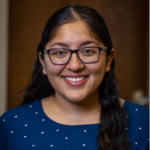 Hazel is a Program Associate at The Funders Network, and handles the programmatic support for Inclusive Economies, Mobility and Access, and PPREP. She has a bachelor’s in sociology from Florida International University. She previously worked as an office assistant at Florida International University – Counseling and Psychological Services and as a research assessor at the University of Miami School of Nursing and Health Studies.
Hazel is a Program Associate at The Funders Network, and handles the programmatic support for Inclusive Economies, Mobility and Access, and PPREP. She has a bachelor’s in sociology from Florida International University. She previously worked as an office assistant at Florida International University – Counseling and Psychological Services and as a research assessor at the University of Miami School of Nursing and Health Studies.
When not working, Hazel enjoys listening to podcasts, making to-do lists, dancing, and exploring Miami.
Barr Foundation's Lisa Jacobson: Europe’s Bike and Transit Systems Are a Marvel, But Only For Some (Cross-Post)
The Funders Network is committed to sharing the stories and strategies of our members, partners and others in the philanthropic sector working to create more sustainable, prosperous and equitable communities.
Today, we’re sharing a recent guest column on StreetsBlog Mass from Lisa Jacobson at the Barr Foundation. (Lisa is also an alum of the PLACES Fellowship's 2017 Cohort and a member of the design committee for the Mobility and Access Collaborative, a TFN initiative.) Her article focuses on the gap in public transportation solutions and the communities they serve.
During a recent six-day study tour with a group of climate grantmakers and advocates in Amsterdam and London, I marveled at the frequent and fully functioning rail, in contrast to my frustration with the T. The vast, connected networks of protected bike lanes, navigable without fear of Boston drivers or cavernous potholes.
I daydreamed about how it’d feel to have more pleasant travels, how much safer and happier our communities could be, and how we could rid our skies of so much climate-changing pollution.
The study tour also provided the opportunity to meet with people working and living in London and Amsterdam, who explained some of the many ways they are leading the world in terms of efficient, net-zero planning. Some of their successes include ambitious mode share goals (that they are realizing); dedicated revenue sources; electrified freight; and coordinated transportation and land use planning.
And yet, throughout the trip, I began to notice gaps in the way transportation solutions were planned. One key takeaway for me was that their approaches were not sufficient for the future of cities in the United States — and that we need to build and improve upon them.
Read the full article here
Featured image: Neighbors enjoy a Dutch "woonerf," or shared street, in Utrecht. Photo by Clarence Eckerson, Jr.
Going PLACES - Trading Palm Fronds for Maple Leaves: What Two Demographically Distinct States can Learn from Each Other
By Xan Avendaño, PLACES Fellow and Program Officer at The Harry and Jeanette Weinberg Foundation
Going PLACES is an occasional blog series featuring the voices and experiences of TFN’s PLACES Fellows. For more information on the fellowship, and to read past blog posts from our fellows, visit here.
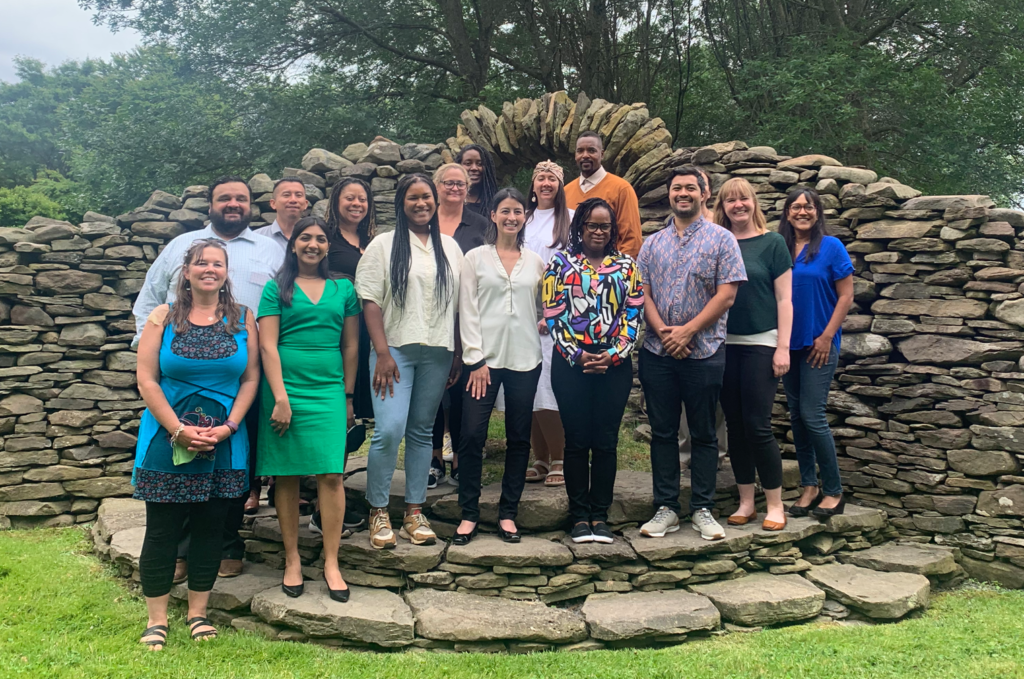
The first things I notice walking around Burlington are the notable differences from my home on O’ahu. In the parks, people rest under the shade of maple trees, rather than banyans or palms. On the water, instead of canoes, sailboats float under an evening sun. But perhaps one of the most glaring differences is the faces of the people I pass on the streets. While Hawai’i consistently ranks as one of the most racially diverse states in the country, Vermont is 94% White.
When our TFN PLACES cohort arrived in Vermont to learn about equitable community development, it was not clear what these two states, with such different ethnic demographics and geographic landscapes, could possibly learn from each other. Yet as we listened to voices discuss life in Vermont – the challenges and creative solutions embedded in rural areas, food systems and housing sectors – I felt the tectonic plates shift, bringing Hawai’i and Vermont closer together. Community development leaders in both states are wrestling with how to transition systems from land ownership to land stewardship, and how to increase and advocate for collective prosperity in an economic system that prioritizes individual gains. The scale and numbers of people of color might differ, but there is plenty to learn from each other.
One area where this is most evident is in food systems. Community leaders of color in both states are advancing local solutions to healthy food systems that use agricultural practices to heal and grow people and land. We explored this intersection at the Intervale Center, where we were hosted by the center’s executive director, Travis Marcotte, and Nick Richardson, president and CEO of the Vermont Land Trust. The setting had an air of peace and urgency. The Intervale Center is a quaint community food hub that sits on a 360-acre campus of protected conservation land on the Winooski River. Prior to the arrival of European settlers, the Abenaki peoples fished wild salmon on that very land along that very river. Today, hardly any wild salmon remain.
Shifting from extractive systems that diminish the salmon supply in the Winooski to systems where land is publicly accessible and food is sustainably grown by local communities is a daunting feat in today’s economic and political landscape. Neither Vermont nor Hawai’i small farmers have much access to the patient capital needed to produce food at scale. At the same time, with 80% of forest acreage in Vermont privately owned by individuals and families, it is no small task to reach a consensus with hundreds of private landowners, particularly in a state where individual freedom is embedded in the state’s motto: “Freedom and Unity.”
Is there a way forward that allows individuals to thrive economically while collectively remaining united?
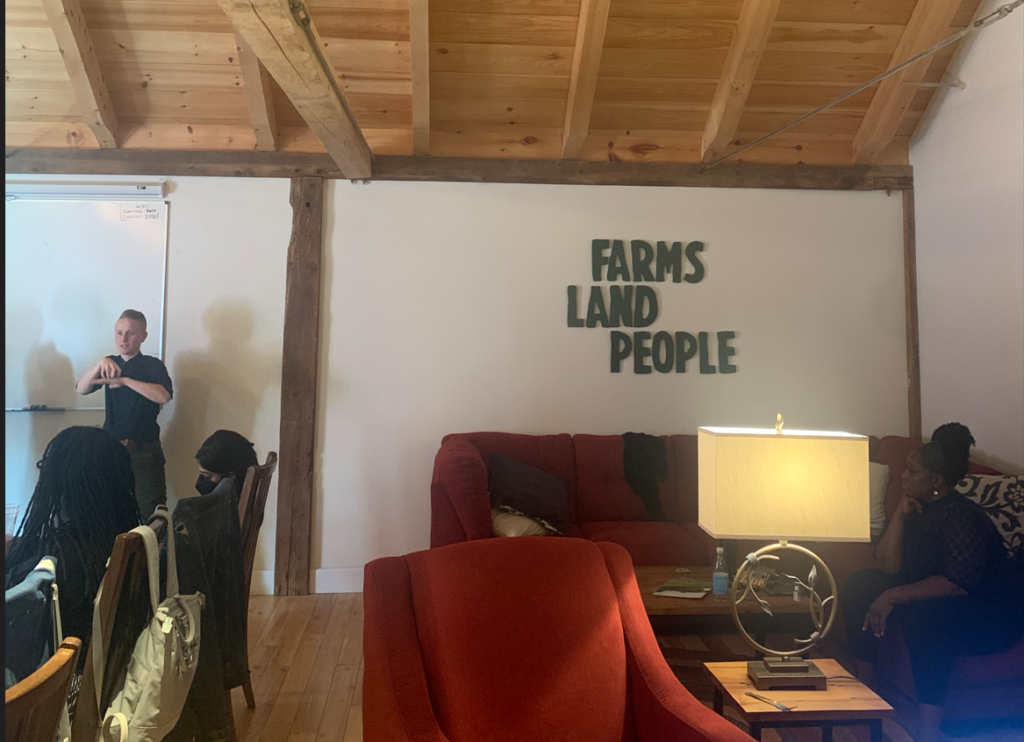
In Hawai’i, leaders across the state are developing food hubs that aggregate small farm production to collectively meet the demands of large institutions like hospitals and public schools. In Vermont, leaders like Travis and Nick have visions for increasing the resilience of local farmers by entering large markets like Boston. At a localized level, a more recent effort from groups like SUSU CommUNITY Farm in southern Vermont represent an opportunity for the growing African diaspora to dig their feet in the soil, plant familiar foods and reclaim their own narratives around food and culture. These groups can learn from similar efforts like HuiMAU on Hawai’i Island, where the community is raising, healing and growing youth and Indigenous food crops on leased land.
Similarly, new models of land stewardship and equitable community development manifest themselves in the housing sector. In conversations with public officials from the City of Burlington, we learned of the inequities and the innovations in motion to address them in the city with a population of 42,000.
One of those inequities is shocking: Only 17 of the 6,000 owner-occupied homes in Burlington are Black-owned, even though Black people represent nearly 10% of the total population. Burlington is in a housing crisis, and the increased number of urbanites buying homes in Vermont during the pandemic makes bridging this racial divide even more difficult today than before. Hawai’i also faces rising housing costs at an even more severe scale, and it is becoming more and more difficult for local residents, particularly Pacific Islanders, to afford to live in their home community.
One potential solution lies in the model of individual homeownership on community-owned land. The Champlain Housing Trust, a shared-equity homeownership model funded by the City of Burlington, combats housing speculation and maintains affordable homeownership opportunities in perpetuity through a community land trust model. This model makes homeownership work for families that can’t afford large down payments and want to make a long term investment in their home community. With 650 homes, The Champion Housing Trust (CHT), is one of the largest community land trusts in the country, and it continues to innovate toward a more equitable future. CHT has recently announced a downpayment assistance program specifically for BIPOC homebuyers, the first-of-its kind program in the sector. This CHT model, which is unafraid to name racial and ethnic divides with the goal of equitable progress, has powerful lessons for our local community in Hawai’i that continues to see more lucrative housing being built and more families unable to afford to live in their home state.
Though it is tempting to focus on the differences between Hawai’i and Vermont, it is in each community’s response to similar challenges that we find solutions that can lift us all. Perhaps the greatest of these solutions lies in the second half of Vermont’s state motto: Unity.
About the Author
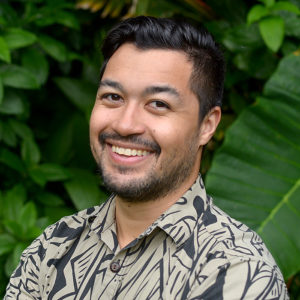
Xan Avendaño (he/him) is a program officer at The Harry and Jeanette Weinberg Foundation in Hawai’i. He is a member of the 2022 PLACES Fellowship cohort.
Call for Proposals: TFN 2023 Annual Conference
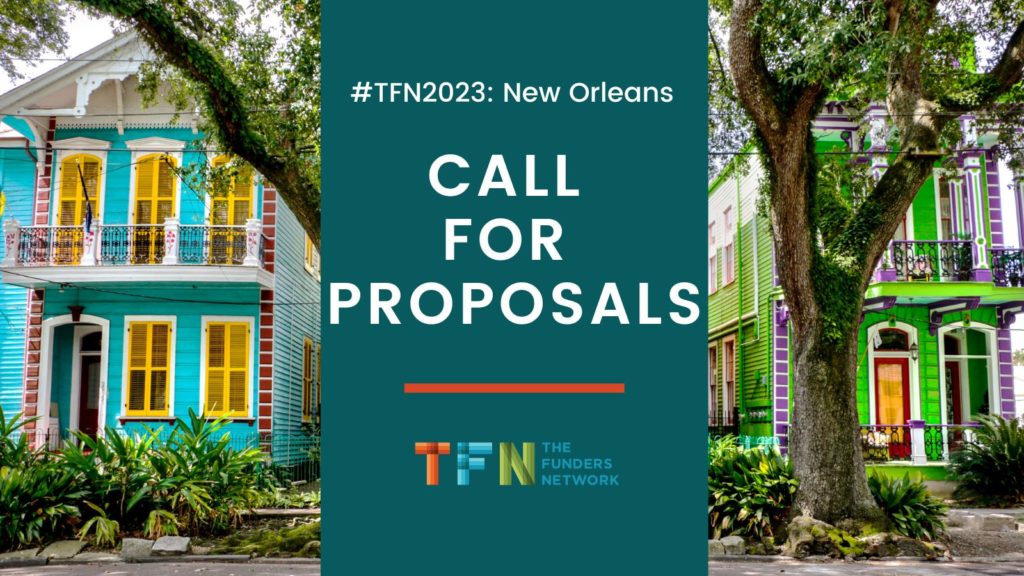
We're headed to New Orleans in March for The Funders Network’s 2023 Annual Conference!
Do you have an idea for a session that will deepen learning, foster collaboration and catalyze action?
TFN invites you to submit a session proposal for our 2023 Annual Conference, which takes place March 20-22 in New Orleans.
Our annual conferences bring together funders from across North America to learn and share ways we can strengthen our ties to the people and places we serve, deploy resources where they are most needed, and push for powerful and creative strategies to address inequities and move toward justice.
We look forward to coming together in New Orleans to delve into and lift up the work that is making an impact amid escalating climate crises, erosion of civil liberties and economic inequities — all of which disproportionately impact low-income communities and communities of color.
Please read on for more information on how to submit a session proposal for TFN’s 2023 Annual Conference.
Submitting a Proposal
→ Read the TFN Conference Proposal Guidelines for information on review and selection criteria, session formats and more.
→ Share your proposed session via our Online Proposal Form.
About #TFN2023

Save the date for TFN's 2023 Annual Conference, which will take place March 20-22 in New Orleans!
We'll gather at the historic Hotel Monteleone, nestled in the heart of the city's French Quarter.
Registration will launch in the winter. Stay tuned for more details!
Grounded in Racial Equity
Our conference planning committee and TFN team are encouraging session ideas that are interdisciplinary, cross-cutting and grounded in racial equity.
TFN’s Strategic & Racial Equity Frameworks share key strategies, our racial equity framework and action plan, and program priorities. Download a copy here.
→ Curious about what we learned and shared at #TFN2022? Check out the full agenda and speaker list for TFN's 2022 Annual Conference: Seize the Moment in San Diego here.
